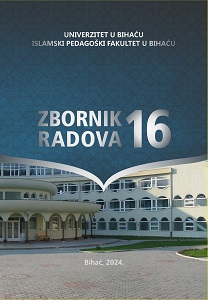BRAK I PORODICA KROZ SEKULARNO I VJERSKO PRAVO
MARRIAGE AND FAMILY THROUGH SECULAR AND RELIGIOUS LAW
Author(s): Muharem ŠtulanovićSubject(s): Gender Studies, Civil Law, Social differentiation, Studies in violence and power, Family and social welfare
Published by: ISLAMSKI PEDAGOŠKI FAKULTET U BIHAĆU
Keywords: Family law; marital law; Istanbul Convention; same-sex marriages and partnerships; gender ideology; revolutionary improvement of women's status; femicide;
Summary/Abstract: Family law norms are predominantly regulated by dispositive norms, meaning that parties regulate their mutual relationships in civil or conventional law by their own will. Only when they fail to do so is the rule from the legal norm applied. Due to the nature and character of these relationships, which are based on feelings of love, affection, and friendship, the enforcement of family law obligations cannot be ensured through direct sanctions, as is the case with matters in the realm of civil law. Of course, these are the positions of conventional law, which does not contemplate regulating overly "personal" family relationships, a stark contrast to Sharia family or marital law. In Bosnia and Herzegovina, as well as in neighboring countries, the influence of the contemporary international community and the application of its legal norms to local legislation is evident, as is the impact of politics and global Euro-Atlantic integrations. These integrations impose laws, norms, conventions, and other international "tasks" on domestic legislation, which in some cases affect the very essence and core of previous legal understandings and terminological definitions. This is particularly evident in this branch of legal science, where direct international interventions promote the rights of LGBT communities, pride parades, and similar activities in our society. International legal acts and conventions are enforced and become sources of family and marital law in certain countries if ratified by their legislative bodies, naturally after entering into force. Such is the case in Bosnia and Herzegovina with the Istanbul Convention. Aware of these local and global trends, as well as the importance of legal regulation of marital relations, family law, and anti-discrimination laws, this paper aims to provide some insights into a comparison between Sharia family/marital law and its legal, moral, and humane superiority over conventional legislation and other legal and religious customs. It also seeks to highlight potential preventive measures against anticipated legal solutions in our context, such as the possible repeal of Article 6 of the Family Law of the Federation and its replacement with the legalization of same-sex marriages and partnerships as a price for Euro-Atlantic integration.
Journal: ZBORNIK ISLAMSKOG PEDAGOŠKOG FAKULTETA U BIHAĆU
- Issue Year: 2024
- Issue No: 16
- Page Range: 13-41
- Page Count: 29
- Language: Bosnian

